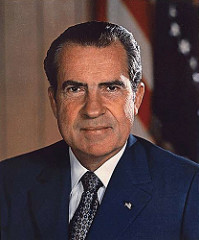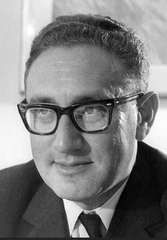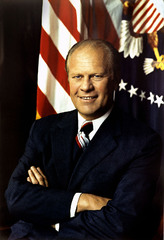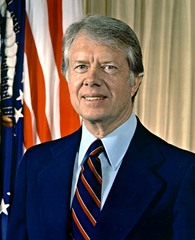APUSH: Chapter 39 – The Stalemated Seventies – Flashcards
Unlock all answers in this set
Unlock answersquestion
Richard Nixon

answer
1968 and 1972; Republican; Vietnam: advocated "Vietnamization" (replace US troops with Vietnamese), but also bombed Cambodia/Laos, created a "credibility gap," Paris Peace Accords ended direct US involvement; economy-took US off gold standard (currency valued by strength of economy); created the Environmental Protection Agency, was president during first moon landing; SALT I and new policy of détente between US and Soviet Union; Watergate scandal: became first and only president to resign.
question
Spiro Agnew
answer
Nixon's vice-president resigned and pleaded "no contest" to charges of tax evasion on payments made to him when he was governor of Maryland. He was replaced by Gerald R. Ford.
question
Henry Kissinger

answer
Awarded 1973 Nobel Peace Prize for helping to end Vietnam War and withdrawing American forces. Heavily involved in South American politics as National Security Advisor and Secretary of State. Condoned covert tactics to prevent communism and fascism from spreading throughout South America.
question
Earl Warren
answer
Chief Justice during the 1950's and 1960's who used a loose interpretation to expand rights for both African-Americans and those accused of crimes.
question
Gerald Ford

answer
(1) became VP after Spiro Agnew resigned (bribery scandal) and became president after Watergate scandal forced Nixon in Aug. 1974; (2) he pardoned Nixon and pushed a conservative domestic policy, but was little more than a caretaker president when respect for government was at an all-time low.
question
James Earl Carter

answer
Former Georgia governor whose presidency was plagued by economic difficulties and a crisis in Iran.
question
Vietnamization
answer
A war policy in Vietnam initiated by Nixon in June of 1969. This strategy called for dramatic reduction of U.S. troops followed by an increased injection of S. Vietnamese troops in their place. A considerable success, this plan allowed for a drop in troops to 24,000 by 1972. . This policy became the cornerstone of the so-called "Nixon Doctrine".
question
Kent State
answer
4 students killed by National Guardsmen after violent protesting in this university.
question
Pentagon Papers
answer
A 7,000-page top-secret United States government report on the history of the internal planning and policy-making process within the government itself concerning the Vietnam War.
question
My Lai Massacre
answer
1968, in which American troops had brutally massacred innocent women and children in the village of My Lai, also led to more opposition to the war.
question
Watergate scandal
answer
A break-in at the Democratic National Committee offices in the Watergate complex in Washington was carried out under the direction of White House employees. Disclosure of the White House involvement in the break-in and subsequent cover-up forced President Nixon to resign in 1974 to avoid impeachment.
question
War Power Act
answer
Passed by Congress in 1973; the president is limited in the deployment of troops overseas to an sixty day period in peacetime (which can be extended an extra 30 days to permit withdrawals) unless Congress explicitly gives its approval for a longer period.
question
Oil Embargo
answer
Economic crisis of 1973 that occurred when OPEC nations refused to export oil to Western nations. Ensuing economic crisis plagued Gerald Ford's time in office.
question
Détente
answer
A policy of reducing Cold War tensions that was adopted by the United States during the presidency of Richard Nixon.
question
Equal Rights Amendment (ERA)
answer
Constitutional amendment passed by Congress but never ratified that would have banned discrimination on the basis of gender.
question
Roe vs. Wade
answer
The U.S. supreme Court ruled that there is a fundamental right to privacy, which includes a woman's decision to have an abortion. Up until the third trimester the state allows abortion.
question
Alcatraz
answer
Island located in the San Francisco Bay that housed prisoners from the 1930's to early 1970's.
question
Wounded Knee (1973)
answer
In February 1973, members of AIM seized and occupied this town in South Dakota, the site of the 1890 massacre of Sioux by federal troops, for two months, demanding radical changes in the administration of the reservation and insisting that the government honor its long-forgotten treaty obligations.
question
Title IX
answer
A United States law enacted on June 23, 1972 that states: "No person in the United States shall, on the basis of sex, be excluded from participation in, be denied the benefits of, or be subjected to discrimination under any education program or activity receiving Federal financial assistance."



